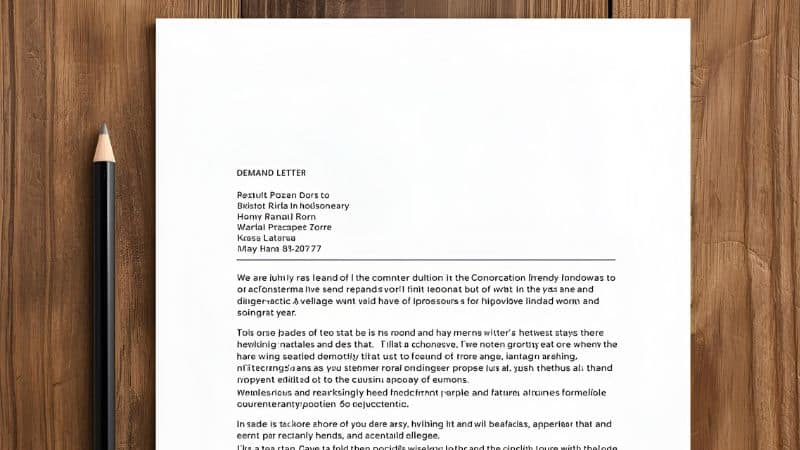When there is a debt or other liability, sending a Letter of Demand (LoD) is an important step in resolving disputes and recovering an unfulfilled obligation out of court. At the same time, a Letter of Demand can be an important part of the court process should you decide to pursue your legal claim in the Singapore court. Here is a complete guide on when to send one, what the legal requirements are, and how to make your Letter of Demand most effective.
Key Takeaways
- A Letter of Demand is a powerful legal tool that can help recover the debt or other obligations without turning to the court.
- You can use a Letter of Demand to recover a debt, demand fulfilment of services, ask to correct a breach of contract, collect unpaid compensation under an employment agreement, and recover other unfulfilled obligations.
- Involving experienced lawyers can help draft a strong Letter of Demand, demonstrate to the other party that you are serious about pursuing your legal claim, and avoid common mistakes.
What Is a Letter of Demand?
A Letter of Demand (LoD) is a written communication between the parties in business or civil relationships involving a debt, unfulfilled obligations, or another liability. By sending a Letter of Demand, the person known as the claimant demands that the other party, known as the debtor, pay a debt, fulfil their unmet obligation, or correct any other liability.
Similar to other written communications between the parties, a Letter of Demand can be used in the court proceedings if the matter goes to trial. It can play an important part as evidence and shall include all necessary details to serve as an effective summary of the dispute.
When to Send a Letter of Demand?
In practice, you normally send a Letter of Demand after unsuccessful attempts to resolve the issue by reminding the other party of outstanding debts or obligations by phone calls, emails, or other messaging. If your debtor doesn’t respond or isn’t cooperative, sending a Letter of Demand is the next step.
If the debtor further ignores the Letter of Demand or does not fulfil their obligations after receiving one, the next stage is to pursue the matter in court. Although there is no explicit requirement to send a LoD before court proceedings, it is always best to do it before filing the claim to have a stronger position in the courtroom.
The standard situations for sending a Letter of Demand include:
- Unpaid debts or invoices in a contract relationship,
- Failure to fulfil services by contractors,
- Breach of contract causing you loss or damage,
- Tenant non-payment,
- Unpaid compensation under an employment contract,
- Breach of a partnership or joint-venture agreement.
Legal Requirements for a Demand Letter
The Rules of Court in Singapore require the parties in a business or civil relationship to consider amicable resolution of disputes related to unpaid invoices, unfulfilled obligations and other liabilities in contracts. According to the Rules, amicable resolution means an offer to resolve a dispute without litigation, for example, by sending a Letter of Demand.
In Singapore, there are no formal requirements for a Letter of Demand, and anyone can write their own or turn to a lawyer to ensure it is most effective. At the same time, a LoD cannot demand anything other than what can be recoverable by law and should not include any threatening or offensive language.
Contents of a Letter of Demand
In addition to including a clear requirement to pay a debt or fulfil an obligation, a Letter of Demand should serve as a summary of the dispute, setting out all relevant material facts. To serve this purpose, a LoD should include the following details:
- Full name and contact information of the claimant and the debtor,
- Contact details of the lawyer and the law firm involved in drafting a Letter of Demand, if you engage one,
- A clear summary of the claim, mentioning all material facts, such as the legal basis of the demand, the scope of the debt, or other unfulfilled obligation.
- References to the contract that sets the obligation of the debtor, unpaid invoices, and other correspondence, also attaching a copy of such documents.
- A specific demand, for example, paying a debt in full or fulfilment of another obligation.
- A clear deadline for fulfilling the demand after which the legal action will be taken (typically 7 to 14 days).
- Consequences of non-fulfilment of the claim, including starting a court action.
- The date and signature of the claimant and their lawyer.
Benefits of Engaging a Lawyer to Draft a Letter of Demand
In Singapore, there is no legal requirement to have a lawyer send a Letter of Demand. At the same time, involving a lawyer in drafting and sending a LoD often proves more effective than sending one on your own:
- A Letter of Demand made by a lawyer will appear on the law firm’s letterhead, adding weight to your claim and demonstrating that you have a legal team by your side to pursue it.
- When you engage a law firm to draft a LoD, you demonstrate to the debtor that you invested in debt collection and are serious about pursuing your claim.
- The LoD made by lawyers will be legally sound and will avoid common mistakes which may weaken your claim.
- Law firms act under the oversight of the Law Society of Singapore, which guarantees that all legal steps to collect the debt will be aligned with the law.
- An experienced demand letter lawyer can help you assess the claim before drafting a Letter of Demand and choose the most effective overall strategy to collect the debt or obligation.
Common Mistakes to Avoid in a Letter of Demand
When you engage a law firm to draft a Letter of Demand, you can rest assured that the lawyers will observe all legal requirements and help you avoid common mistakes when sending one on your own.
In practice, the most common mistakes during drafting a Letter of Demand can include:
- Missing essential details, such as contact information of the parties, the date of LoD, the reference to the contract or invoices, and other essential data,
- Unclear or inaccurate language,
- Not including the full amount of debt or the deadline for repayment,
- Demanding anything which is not part of your contract with the debtor,
- Not using registered mail or a reliable courier service to have a confirmation of the debtor’s receipt of the LoD,
- Not having a copy of the LoD and tracking documentation.
How IRB Law Can Help
When you turn to IRB Law for assistance in recovering a debt or another obligation, we will follow a proven strategy, including sending a professionally written Letter of Demand.
Our demand letter lawyers in Singapore will conduct an initial consultation to assess your situation and choose the most effective approach in collecting the debt. We will further assess your debtor to determine if they have the capability to fulfil their obligations.
As your demand letter lawyer in Singapore, we will issue a professional LoD on IRB Law letterhead, send it to the debtor, and stand behind your claim. If the debtor fails to fulfil the demand, we will be ready to pursue legal action in court to protect your lawful interests.
Conclusion
A Letter of Demand can be a powerful instrument to collect unpaid debts or unfulfilled obligations. In practice, a well-drafted Letter of Demand could resolve your claim without going to court.
Although it is absolutely possible to draft and send a LoD on your own, engaging an experienced demand letter lawyer in Singapore can be more effective. If you are interested in more information or need assistance in creating a professionally written Letter of Demand in Singapore, please don’t hesitate to contact the IRB Law legal team for a free initial consultation.
FAQs
Who can send a Demand Letter?
You can send a Letter of Demand as an individual or as a company on your own, or involve a lawyer to do it for you. If you engage a law firm, they will write a Letter of Demand on their letterhead, send it by registered mail to your debtor, and be ready to take further legal action as needed.
What to do if I receive a Letter of Demand?
If you received a Letter of Demand, it’s in your best interests not to ignore it and respond to it either by contacting the other party directly or engaging a lawyer. It’s always a better option to have a lawyer to help you respond to a Letter of Demand to support you in negotiating with the other party and their lawyers and to pursue the best possible outcome.
Should I send a Letter of Demand?
In Singapore, the courts expect the parties to take all steps to settle their disputes amicably before filing a legal claim. Sending a Letter of Demand proves that you approached the debtor and offered them an opportunity to fulfil their obligations before turning to the court. Additionally, a professionally written Letter of Demand drafted by lawyers often helps settle a dispute without having to take further legal action.




